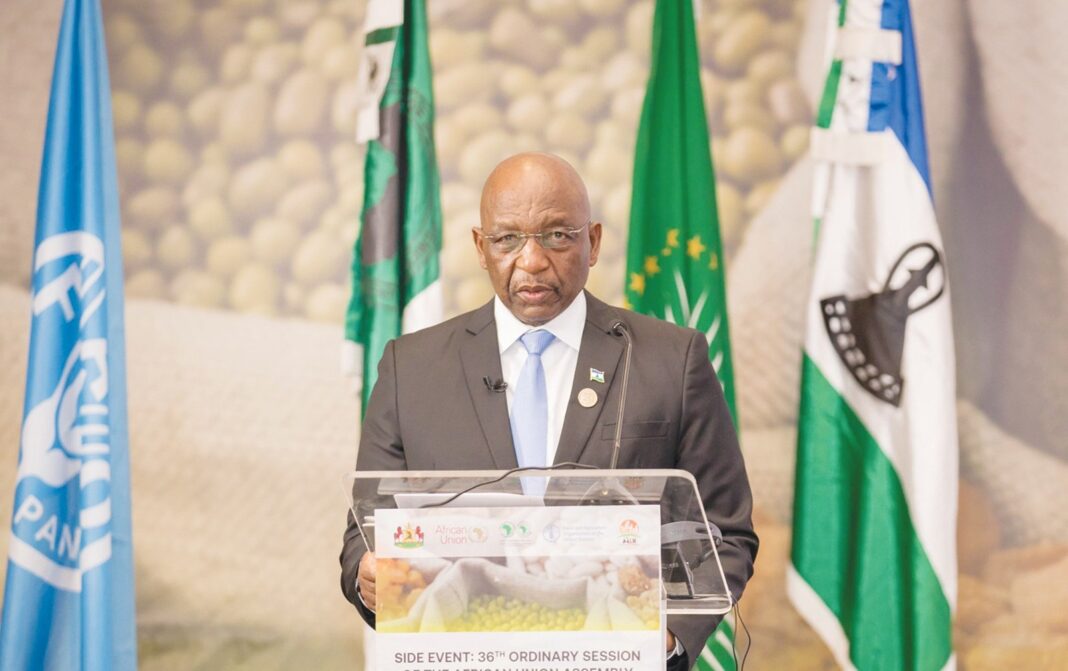Lesotho requires robust support from development partners – including the World Bank, African Development Bank, United Nations, European Union, and the United Kingdom – to enhance and sustain public-private dialogue (PPD), Prime Minister Sam Matekane has said.
Speaking at the third PPD forum this week, Matekane underscored the role of the platform in promoting active engagement between the government and the private sector.
“With support from development partners, we are advancing projects in water, energy, agriculture, and institutional reform,” Matekane stated.
The Public-Private Dialogue forum is an initiative aimed at encouraging collaborative and constructive interaction between the private sector and the government to drive economic growth and reform.
Highlighting ongoing efforts, Matekane pointed to initiatives such as building a modern agricultural value chain by developing irrigation, storage, and processing infrastructure -particularly for high-value exports like citrus fruits and local import substitutes like pork and poultry.
He also noted the potential for Lesotho to tap into the regional automotive sector through value-chain integration.
“We are committed to ensuring that Lesotho is fully integrated into the African market, particularly through the African Continental Free Trade Area (AfCFTA),” he said.
To ensure continuity and real impact, Matekane announced the institutionalisation of the PPD process through a formal Memorandum of Understanding with the Lesotho Chamber of Commerce and Industry (LCCI) and the Private Sector Foundation of Lesotho. He said a standing secretariat, and technical working groups would be established to move beyond consultation and toward implementation.
“I will personally lead this engagement, continuing my approach to ‘listen to the nation’,” Matekane declared, stressing the importance of inclusive governance.
His remarks come at a time when Lesotho is grappling with significant challenges, including global economic uncertainty, trade shocks, and persistently high unemployment.
LCCI secretary general, Fako Hakane, echoed the importance of structured dialogue, stating that consistent engagement is vital for building trust and transparency between the public and private sectors.
“There should be consistent and structured dialogue,” Hakane said. “It is critical for building relationships and addressing issues proactively.”
He further stressed the importance of inclusive and transparent decision-making processes that ensure all stakeholders feel heard.
“PPD can help identify and address factors that hinder economic growth—such as regulatory bottlenecks, inadequate infrastructure, or market failures,” he noted.
Hakane added that an effective PPD mechanism could also support the development and implementation of policies that promote private sector growth, job creation, and an improved business climate.
Chaba Mokuku, Manager of the Competitiveness and Financial Inclusion Project, highlighted the positive impact of foreign direct investment (FDI), particularly in the apparel industry.
He said export-oriented FDI had generated jobs, especially for women, while reducing poverty and building new skills.
From 2007 to 2019, Mokuku pointed out, Lesotho implemented 11 reforms, including the establishment of the Lesotho National Single Window, automated land information systems, a credit bureau, and streamlined processes for business registration and construction permits.
However, he acknowledged that these efforts were undermined by weak implementation and poor coordination across government agencies and with development partners.
“The legal and regulatory framework for investment remains incomplete and inconsistent,” Mokuku said. “Institutional mandates often overlap or are poorly defined, creating confusion and opportunities for rent-seeking and corruption.”
He indicated that FDI proposals are often handled on an ad-hoc basis, generating uncertainty among investors and further exacerbating inefficiencies.
To attract sustainable investment, Mokuku stressed the need for clear, standardised procedures and a streamlined, transparent regulatory environment.








